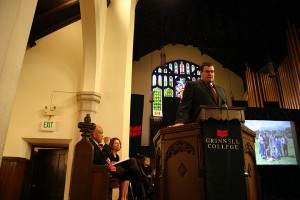By Elise Gallant
Yesterday in Herrick Chapel the Young Innovator for Social Justice Prize was awarded to Erik Glustrom and Boris Bulayev (jointly), Rabbi Melissa Weintraub and James Kofi Annan.
Glustrom and Bulayev worked with refugees in Uganda to start Educate!, a program designed to empower the refugees by giving them access to schooling.

“We hope to unlock their potential to solve their community’s problems,” Boris Bulayev said, hoping to empower them as current students to eventually become future teachers.
Rabbi Melissa Weintraub cofounded Encounter, a program designed to build relations between American Jews and Palestinians. The program familiarizes Jewish leaders by having them visit different Palestinian cities to understand the Palestinian perspective. It is the only significant non-military Jewish presence in Palestinian areas of the West Bank throughout the last decade. Weintraub emphasizes that the media predominantly shows violent images, which disambiguate the Palestinians. This encounter allows for person-to-person interactions that break down the violent stereotypes, according to Weintruab.
“When you meet real people the real people are different than our images,” said Weintraub.
The final recipient, James Kofi Annan, began Challenging Heights as an initiative to provide education and support for children who were abducted as child slaves in Ghana. Annan used his own experiences of forced labor as a child slave from age six through 13 as motivation and for direction. Challenging Heights works to address the root causes of child trafficking and provides materials and resources for educating children and families who suffered from child slavery.
Each of the recipients demonstrated leadership, creativity and commitment and were able to manifest real changes in the communities where they worked.
“I was stunned with the selection of the award winners including the diversity and how far reaching it was,” said alumnus Henry Wilhelm ’68.
The recipients were chosen out of over 1,000 applications from 66 countries. A panel of 150 faculty, staff and student volunteers reviewed them, before reaching the selection committee of 10 representatives appointed by President Raynard Kington. The 10 members of the selection committee were comprised of members from the College’s faculty, student body, alumni, staff and trustees as well as other prominent advocates for social justice. The process of selection was innovative in and of itself.
“I think this is a fairly unique model for selecting,” said Emily Westergaard Hamilton ’02, a member of the selection panel. “One thing that I would like to see in the future is more of a discussion on what is social justice and what is innovative social justice.”
The future of the Social Justice Prize is uncertain and to be determined by President Raynard Kington. This year’s winners will visit campus in late October next semester. The College is working with the winners to create internships and other opportunities for student interaction.


































































Melisa Chan • May 6, 2011 at 9:48 am
The panel of 150 volunteer reviewers also included alumni: 1/3 students, 1/3 alumni, and 1/3 faculty/staff.